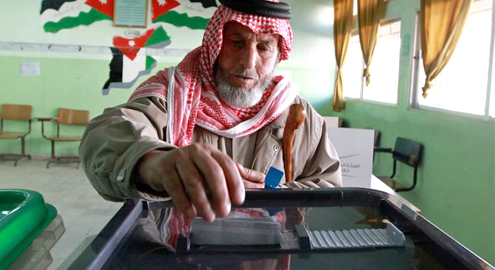
Jordanians are voting in parliamentary elections boycotted by the Muslim Brotherhood, which says the electoral system is rigged in favour of rural tribal areas and against the urban poor.
The Brotherhood and the National Reform Front of former prime minister and intelligence chief Ahmad Obeidat are staying away from the polls, which opened for 12 hours from 04:00 GMT on Wednesday.An estimated 2.3 million Jordanians are eligible to vote at 1,484 polling stations, choosing from 1,425 candidates, vying for a four-year term in the 150-seat lower house of parliament.”So far, 125,000 have cast their votes,” reported Al Jazeera’s Nisreen El-Shamayleh from Amman.
Wednesday’s elections are based on a new electoral framework in which for the first time parliamentarians, not the king, will choose the prime minister.The government is touting the polls as a milestone in a gradual process of bringing greater democracy, but the opposition says King Abdullah’s decisions do not go far or fast enough to end his monopoly on power.
The Muslim Brotherhood is the single most popular party in Jordan, with strong support in cities, especially among poorer Palestinians who live there. Four smaller parties, including communists and Arab nationalists, are also boycotting the vote.
The boycott has reduced the election to a contest between tribal leaders, establishment figures and business executives, with just a few of the near 1,500 candidates running for recognised parties.The result might hand more power to the tribal figures who are keen on maintaining costly state patronage that serves their interests, but is resented by large parts of the urban poor who feel left out, politically and economically.
Sparsely populated rural and tribal constituencies, where pro-government tribes are strong, get a bigger weighting in parliament than the Palestinian-dominated poor urban constituencies where the religious conservatives find their support.”This is a sham election whose results will only erode the credibility of the future parliament,” said Zaki Bani Rusheid, deputy head of the Muslim Brotherhood.
“We have heard about violations in the election already,” repoted El-Shamayleh. She said Rassid, a group of civilian observers, “say they have been prevented from entering some of the polling stations. Rassid also says it has concrete evidence that vote-buying took place, with some of the votes being sold for up to $140″.For many Jordanians, the economy is a pivotal issue in the vote.”We hope that the upcoming parliament will decrease the economic burden on the shoulders and on the pockets of the poor people,” said Mahmoud Al-Sayyed Ahmed, an Amman resident.
The poll is held amid economic hardships, with IMF-guided austerity policies that the government was forced to adopt last year to avoid a fiscal crisis after years of using government money on a bloated public sector.Last November, steep fuel price rises provoked sometimes violent protests.The king has said the next steps to develop the country’s democracy will be an overhaul of the political parties.He wants to streamline Jordan’s 23 small and fractured political parties into three or five coalitions based on ideology – right, left and centre – for future parliamentary elections. – Aljazeera












